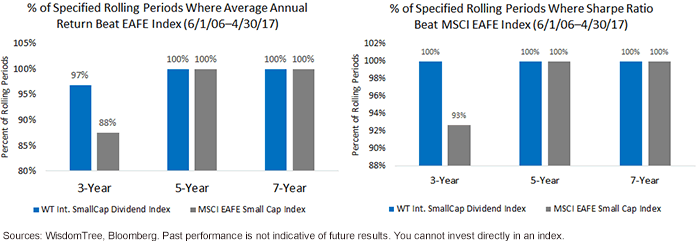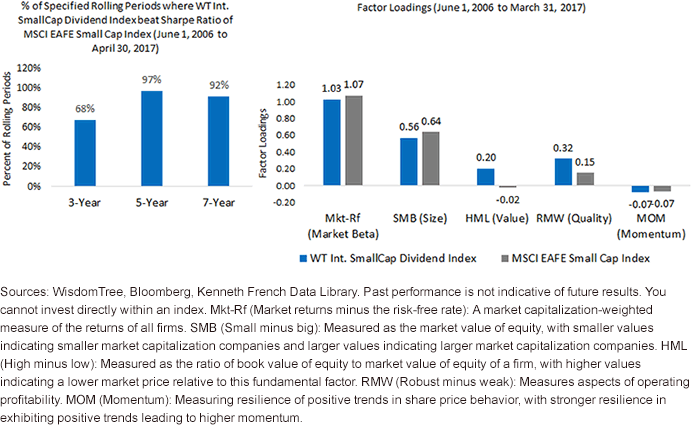Don’t Overlook Developed International Small Caps


What do the S&P 500, MSCI EAFE and MSCI Emerging Markets indexes have in common? While regional exposures clearly differ, the dominant exposure is to large-cap stocks. Today, we ask a question:
Why don’t more investors utilize the full market capitalization size spectrum (large cap, mid-cap and small cap) when looking at international opportunities?
Initial Hypothesis: The Risk/Return Trade-offs Simply Aren’t Beneficial
In thinking of possible reasons, we can start with the idea that the risk/return trade-offs must not be beneficial relative to an MSCI EAFE Index exposure—if, in fact, we focus our attention on the developed international sphere. The WisdomTree International SmallCap Dividend Index has been calculated live for nearly 11 years, and we can of course compare returns to the MSCI EAFE Small Cap Index benchmark. For the full period, from June 1, 2006, to April 30, 2017,1 we found the following:
- The MSCI EAFE Index delivered 2.85% per year
- The MSCI EAFE Small Cap Index delivered 4.70% per year.
- The WisdomTree International SmallCap Dividend Index delivered 6.33% per year.
But this is just a single period, one might say. How about a rolling period analysis over these 11 years?
Rolling Period Analysis: 3-Year, 5-Year & 7-Year vs. MSCI EAFE Indexlysis over these 11 years?

The key question across this initial analysis regards adding incremental return versus the MSCI EAFE Index, since it already has the lion’s share of investor attention within developed international stocks.
- On a rolling five- and seven-year basis by way of average annual returns, both the WisdomTree International SmallCap Dividend Index and MSCI EAFE Small Cap Index beat the MSCI EAFE Index in 100% of the rolling periods measured. Three-year rolling period results also strongly favored the small-cap indexes.
However, we understand what most might be saying—small caps add risk. Yes, the returns may have been stronger and may have had good consistency of outperformance, but the risk profile still may have favored the MSCI EAFE Index if we were to look at the picture on a risk-adjusted basis.
- Looking at the rolling five- and seven-year Sharpe ratio comparisons, both the WisdomTree International SmallCap Dividend Index and MSCI EAFE Small Cap Index beat the MSCI EAFE Index in 100% of the rolling periods studied. The WisdomTree Index also had a higher Sharpe ratio than the MSCI EAFE Index in 100% of the rolling three-year periods studied.
So, this nearly 11-year period that includes all sorts of “interesting events” (Global Financial Crisis of 2008–2009, Greek Debt Crisis in Europe, Brexit vote) advocates quite strongly for developed international small caps.
Is WisdomTree Adding Anything versus the MSCI EAFE Small Cap Index?
For starters, over the last 11 years we saw a pickup of about 160 basis points (bps) in return—so we know that, from the Index’s cumulative return over 11 years, dividend weighting did improve results.
But looking further at rolling period analysis, we jump directly to a rolling period Sharpe ratio comparison so we can look at risk-adjusted returns. We also illustrate a factor analysis to see what (if anything) beyond the so-called “size” premiums is being tapped into.
Developed International Small Caps: Sharpe Ratio & Factors

- Measuring the rolling period Sharpe ratios, on a three-year basis the WisdomTree International SmallCap Dividend Index beat the MSCI EAFE Small Cap Index two-thirds of the time. Rolling five- and seven-year periods indicated the WisdomTree International SmallCap Dividend Index’s risk-adjusted returns were better more than 90% of the time. So there is no question that the WisdomTree strategy delivered strongly relative to what many would consider to be international small-cap “beta,” but was this because of the small-cap premium or some other factor?
- Loadings to two distinct premiums, value and quality, were the most important factor differentiation between the WisdomTree International SmallCap Dividend Index and the MSCI EAFE Small Cap Index. The WisdomTree strategy loaded significantly more positively in both of these factors, and these factors added value over this period.
Active, Passive or WisdomTree?
Many today are questioning their more active exposures, and a lot of flows have been going toward passive approaches. The WisdomTree International SmallCap Dividend Index represents the core of what WisdomTree was looking to develop nearly 11 years ago—transparent, rules-based strategies that can add value at a low cost2 to strategic allocations. We’d say the live track record indicates initial success, and we believe in the potential of reapplying this discipline in the future.
1Source: Bloomberg, with data for specified period 6/1/06–4/30/17.
2Ordinary brokerage commissions apply.
Important Risks Related to this Article
Foreign investing involves special risks, such as risk of loss from currency fluctuation or political or economic uncertainty.
Investments focusing on certain sectors and/or smaller companies increase their vulnerability to any single economic or regulatory development.

Christopher Gannatti began at WisdomTree as a Research Analyst in December 2010, working directly with Jeremy Schwartz, CFA®, Director of Research. In January of 2014, he was promoted to Associate Director of Research where he was responsible to lead different groups of analysts and strategists within the broader Research team at WisdomTree. In February of 2018, Christopher was promoted to Head of Research, Europe, where he was based out of WisdomTree’s London office and was responsible for the full WisdomTree research effort within the European market, as well as supporting the UCITs platform globally. In November 2021, Christopher was promoted to Global Head of Research, now responsible for numerous communications on investment strategy globally, particularly in the thematic equity space. Christopher came to WisdomTree from Lord Abbett, where he worked for four and a half years as a Regional Consultant. He received his MBA in Quantitative Finance, Accounting, and Economics from NYU’s Stern School of Business in 2010, and he received his bachelor’s degree from Colgate University in Economics in 2006. Christopher is a holder of the Chartered Financial Analyst Designation.

